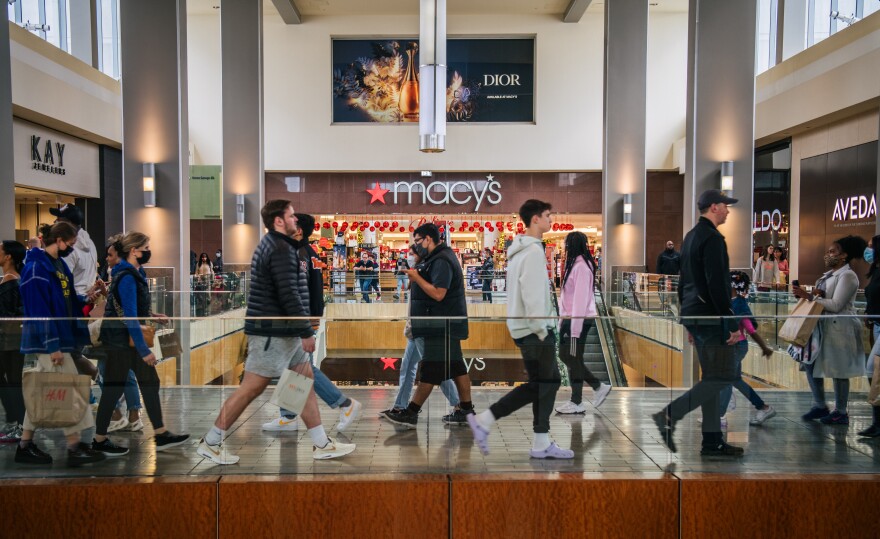This story is free to read because readers choose to support LAist. If you find value in independent local reporting, make a donation to power our newsroom today.
Big Stores See How We Spend. Here Are 4 Things They Say About The Economy

It's a tentative sort of anxiety. Large store chains such as Walmart, Home Depot and T.J.Maxx are steeling for a tricky year, given that shoppers have begun cutting back — but how much further? Some retailers, such as Best Buy and Macy's, are already feeling the slowdown.
More than a dozen retailers have dropped a flurry of financial reports in recent weeks. They have a broad view of consumer spending, which is a key driver of the U.S. economy. Here's what they say.
People are still spending, though stores' forecasts are cautious
Discounts during the holidays and a fairly warm January brought shoppers out to malls and department stores in a surprise shopping spree to start the year. Big-box and food giants — Walmart, Costco, Target, Kroger, McDonald's and others — reported growing sales thanks to higher prices on food and essentials.
McDonald's CEO Chris Kempczinski said the U.S. may see a "mild to moderate" recession and that U.S. inflation will continue but has likely peaked:
"Overall, the consumer, whether it's in Europe or in the U.S., is actually holding up better than what we would have probably expected a year ago or six months ago."
Arun Sundaram, who tracks many retail and food companies at the equity research firm CFRA, says companies were stung by the unexpected twists of last year, including soaring inflation and the war in Ukraine. So they want to set low expectations for another uncertain year.
Walmart CEO Doug McMillon cited "a lot of unknown unknowns" even as he forecast growth in store sales for the year:
"Customers are still spending money. ... It's obviously not as clear to us what the back half of the year looks like. ... We could tilt into a recession. We don't know what happens to consumer spending. We don't know what happens to layoffs, household income."
Food and beauty products are the splurges of the moment
Shoppers are being choosy (or "choiceful," as Walmart put it) as they buy fewer electronics, for example, spending that money instead on essentials. We heard this from Kohl's, Walmart, Target — and Best Buy, which forecast that 2023 will be the worst year yet for sales of computers and other consumer electronics.
High food inflation has meant more spending on groceries, which led to Kroger making one of the most optimistic sales forecasts for the year. Fast food prices have also increased, and Wendy's CFO Gunther Plosch said its stores haven't seen "any visible pushback from consumers." (He added that Wendy's itself saw the biggest inflation on fries — and biggest price decrease on beef.)
Makeup, skincare and perfume counters are other places where shoppers are splurging. Target and Kohl's (which has a deal with Sephora) both called out high spending on beauty products as one way they're offsetting loss of interest in other departments.
We're shifting more spending toward travel and activities
Home Depot blamed a recent slowdown in shopping on, among other things, shoppers dedicating more of their budgets to outings and trips. The retailer said people are still renovating and doing projects, but spending more carefully on big-ticket items like appliances, grills or patio furniture.
Best Buy and Macy's highlighted the same trend. Macy's CEO Jeff Gennette said he expected people of all incomes to feel financial pressure this year:
"On the surface, the consumer is in better shape than 2019. Jobs and wages are strong, and savings levels are elevated relative to historic levels. But ... inflation has surpassed wage growth, and revolving credit is rising. ... [We] expect the allocation of disposable income to continue shifting toward services and essential goods. ... [But] we believe the desire to be with loved ones, go on vacation, and attend events has not diminished, and expect gift-giving and occasion-based demand to continue.
In that vein, Costco's CFO Richard Galanti mentioned some tentative signs that people may be starting to spend more on things that they may need for activities, like camping and water-sports gear. He also flagged easing inflation:
"We continue to see some improvements in many items, commodity prices are starting to fall – not back to pre-COVID levels in some examples, but continue to provide some relief – things like chicken, bacon, butter, steel, resin, nuts...Our average transactions, our shopping frequency is up...So those things bode well, but people certainly are spending their dollars where they feel like they should be spending them."
(Wealthier) Shoppers are switching to cheaper stores and to store brands
Fast food spots like Wendy's are seeing more higher-income customers, who may be switching from pricier restaurants. These wealthier shoppers are also key drivers of Walmart's growing grocery sales.
Dollar stores and discounters like T.J.Maxx are reporting growing sales, with new shoppers coming to Dollar Tree, as CEO Rick Dreiling said:
"What we are seeing is the consumer making $80,000 a year is trading down...The current economic climate is driving more higher-income consumers into value retail."
Store brands are on the rise, too. Costco, Kroger, Walmart and Target said shoppers are increasingly picking up private brands rather than big national brands, like Kroger's private label Home Chef. These products actually give companies higher profits.
CFRA analyst Sundaram said the record-low unemployment rate and savings people built up during pandemic lockdowns have propped up a lot of the current spending.
"The consumers still have a willingness to spend, but their ability to spend has started to decline," he said, "and now it's starting to decline at maybe a more alarming rate."
Copyright 2024 NPR. To see more, visit npr.org.







